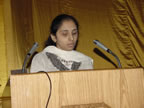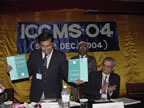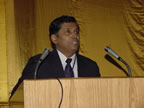INTERNATIONAL CONGRESS ON COMPUTATIONAL
MECHANICS & SIMULATION (ICCMS-04)
(December 9-12, 2004)
The Inaugural function of the International Congress on Computational mechanics and Simulation was held on December 9, 2004 at 2.00 p.m in Lecture Hall L-7. The program started with Invocation from Ms. Radha Harish. Prof. Ashwini Kumar, Convenor welcomed the gathering and the Chief Guest Dr. Anil Kakodkar, Director Prof. Sanjay G Dhande and Prof. Tarun Kant. Prof. N.G.R.Iyengar, Prof. N.G.R.Iyengar Convenor gave details of the Congress activities. In all 85 papers will be presented during the 4 day deliberations. The papers have been received from number of countries. A book of Abstract and the two volumes of the proceedings cover all the papers. The papers have been grouped under various themes like Computational Mechanics, Nonlinear mechanics, Transient dynamic problems,composite materials, Fracture and damage mechanics, Fluid-structure interaction and Smart Structures. He expressed the hope that the delegates would find the deliberations quite useful. Prof. Sanjay G dhande while addressing the gathering, emphasized the dominant role of Computational mechanics and highlighted the three major aspects-analytical, experimental and computational. He said that the engineering fraternity was faced with the biggest challenge that was its application now on nano scale. He said, computational mechanics had traveled three decades yet there was enough room for improvements and achievements. Later he introduced the Chief guest and the Keynote speaker, Dr.Anil kakodkar, Chairman, Atomic Energy Commission & Secretary, Department of Atomic Energy.
In his keynote address Dr. Anil Kakodkar termed computational mechanics as the emerging field of science as it helps researchers visualize things before hand by providing greater insight thus saving time and money. The technology also provides the facility of online damage monitoring system, 3D modeling of piping system, fracture assessment of bimetallic welds. The session concluded with vote of thanks from Prof. Ashwini Kumar.

|

|

|
 |

|

|

|
 |

|

|

|
 |

|

|